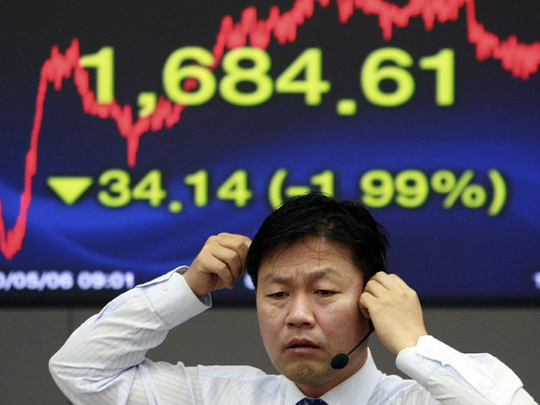
Tokyo: Asian stock markets have fallen following massive losses on Wall Street, even as Japan’s central bank pumped 2 trillion yen ($21.8 billion) into money markets after global financial markets hit major turbulence on growing Greek debt fears.
Japan’s benchmark Nikkei 225 stock average dropped 400.06 points, or 3.7 per cent, to close the Friday morning session at 10,295.63. It was down 2.8 per cent in afternoon trading. South Korea's Kospi was off by 2.1 per cent, while Australia's benchmark recovered from heavy early losses and was down 0.6 per cent.
Bank of Japan official Yuichi Adachi said Friday that the emergency measure was meant to "ensure stability in financial markets by providing ample funds to banks." The move came after the yen appreciated sharply overnight. Investors dumped shares across the board in Asia after the Dow Jones industrials plunged 1,000 points at one point Thursday - the biggest drop ever during a trading day - on fears that Greece's debt problems could halt the global economic recovery.
On Thursday in New York, the Dow Jones industrials plunged 1,000 points at one point - the biggest drop ever during a trading day. Apart from Greece's debt crisis, a simple typographical error may have caused a massive U.S. sell-off. The Dow later recovered some of its earlier losses, closing at 10,520.32, down 3.2 per cent.
Oil prices hovered above $77 a barrel Friday in Asia, halting an 11 per cent sell-off this week as the euro strengthened against the dollar. Benchmark crude for June delivery was up 54 cents to $77.65 a barrel at midday Singapore time in electronic trading on the New York Mercantile Exchange. The June contract lost $2.86 to settle at $77.11 on Thursday.
Crude prices have fallen from an 18-month high of $87.15 that was hit Monday. That level was reached as the dollar surged against the euro amid investor concern a $142 billion bailout package for Greece won't be enough to keep the debt crisis from spreading to other European countries. Commodities priced in dollars, such as oil, become more expensive for investors holding euros as the U.S. currency strengthens.
The euro, which fell to a 14-month low of 1.2520 on Thursday, rose to $1.2705 on Friday while the dollar jumped to 92.79 yen from 90.78 yen. "Fear of contagion to Spain and Portugal is being taken very seriously," Sander Capital Advisors said in a report. "If the euro continues to trade lower it will put additional pressure on oil."












